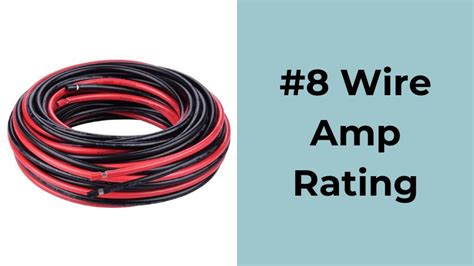The world of electrical wiring can be complex and overwhelming, especially when it comes to understanding the intricacies of wire gauges and their corresponding ampacity. In this article, we will delve into the realm of 8 gauge wire amps, providing a comprehensive guide to help you navigate the nuances of electrical wiring.
Understanding Wire Gauges
Before we dive into the specifics of 8 gauge wire amps, it's essential to understand the concept of wire gauges. Wire gauges are a measure of the thickness of a wire, with lower gauges indicating thicker wires and higher gauges indicating thinner wires. The most common wire gauge system used in North America is the American Wire Gauge (AWG) system.
What is 8 Gauge Wire?
8 gauge wire is a relatively thick wire, with a diameter of 0.1285 inches (3.264 mm). It is commonly used for a variety of applications, including residential and commercial electrical wiring, automotive wiring, and industrial control systems.
8 Gauge Wire Amps: Understanding Ampacity
Ampacity refers to the maximum amount of electrical current that a wire can safely carry. The ampacity of a wire is determined by its gauge, insulation type, and operating temperature. For 8 gauge wire, the ampacity varies depending on the specific application and operating conditions.
According to the National Electric Code (NEC), the ampacity of 8 gauge wire is as follows:
- For copper wire with a temperature rating of 86°F (30°C), the ampacity is 55 amps.
- For copper wire with a temperature rating of 104°F (40°C), the ampacity is 50 amps.
- For aluminum wire with a temperature rating of 86°F (30°C), the ampacity is 40 amps.
Factors Affecting 8 Gauge Wire Amps
Several factors can affect the ampacity of 8 gauge wire, including:
- Temperature: Higher temperatures can reduce the ampacity of a wire.
- Insulation type: The type of insulation used can affect the ampacity of a wire.
- Number of conductors: The number of conductors in a cable can affect the ampacity of the individual wires.
- Wire material: The material used to make the wire (copper or aluminum) can affect the ampacity.
Practical Applications of 8 Gauge Wire
8 gauge wire is commonly used for a variety of applications, including:
- Residential wiring: 8 gauge wire is often used for residential wiring, particularly for 240-volt applications such as electric dryers and air conditioning units.
- Commercial wiring: 8 gauge wire is also used for commercial wiring, particularly for applications that require high current capacity.
- Automotive wiring: 8 gauge wire is used in the automotive industry for applications such as battery cables and starter wires.
- Industrial control systems: 8 gauge wire is used in industrial control systems for applications such as motor control and power distribution.
Safety Considerations
When working with 8 gauge wire, it's essential to follow proper safety protocols to avoid electrical shock or fire. Some safety considerations include:
- Use proper insulation: Ensure that the wire is properly insulated to prevent electrical shock.
- Avoid overheating: Avoid overheating the wire, as this can reduce its ampacity and increase the risk of electrical shock or fire.
- Use proper connectors: Use proper connectors and terminals to ensure secure connections and prevent electrical shock.
Gallery of 8 Gauge Wire Applications






Frequently Asked Questions
What is the ampacity of 8 gauge wire?
+The ampacity of 8 gauge wire varies depending on the specific application and operating conditions. According to the National Electric Code (NEC), the ampacity of 8 gauge wire is 55 amps for copper wire with a temperature rating of 86°F (30°C).
What are the common applications of 8 gauge wire?
+8 gauge wire is commonly used for residential wiring, commercial wiring, automotive wiring, and industrial control systems.
How does temperature affect the ampacity of 8 gauge wire?
+Higher temperatures can reduce the ampacity of 8 gauge wire. According to the National Electric Code (NEC), the ampacity of 8 gauge wire is reduced by 10% for every 10°F (5.5°C) increase in temperature above 86°F (30°C).
In conclusion, 8 gauge wire is a versatile and widely used wire gauge that is essential for a variety of applications. Understanding the ampacity of 8 gauge wire and the factors that affect it is crucial for ensuring safe and efficient electrical wiring. By following the guidelines outlined in this article, you can ensure that your electrical wiring projects are completed safely and effectively.
